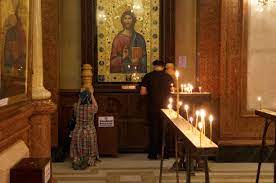I acknowledged my sin to Thee, and I did not hide my iniquity; I said, “I will confess my transgressions to the Lord”; then Thou didst forgive the guilt of my sin.
Psalm 32:5
God and Father of our Lord Jesus Christ, having raised us up from our beds and brought us together at the hour of prayer, give us grace as we open our lips and accept the best thanks we can offer. And teach us Your commandments, for we know not how to pray fittingly unless You, Lord, through Your Holy Spirit, lead us (Romans 8:26) Wherefore we pray, if up to this moment we have sinned, in word or in deed or in thought, deliberately or not, loose, remit, forgive. If You retain sins, Lord, O Lord, who can stand: With You there is deliverance (Psalm 129:3[130:3]). You alone are holy, our Help, mighty Champion of our lives, and our hymns of praise are to You forever. May the might of Your Kingdom be blessed and glorified, of the Father and of the Son and of the Holy Spirit, now and forever, and to the ages of ages. Amen.
(Adapted from the Translation by Narthex Press of the 12 Orthros Prayers)
We need a conscience that we are not perfect, we need forgiveness, and with it, repentance.
There are twelve prayers that a priest offers during the Orthros (Matins) service which are never heard aloud. Each has a theme that sets the tone for the day. I don’t think there is anything wrong with me sharing these prayers or for anyone to pray them. I enjoy sharing thoughts about faith and about Christ each day, as well as giving you occasional insights into the priesthood. I hope the reflections on these prayers will give all of us something to think and add to our spiritual journeys. I’m changing the format of the Prayer Team for these reflections—both the scripture verse and the prayer will precede the reflection for this unit.
Oftentimes, when people pray, they go directly to supplication, to asking God for something. The procrastinating student’s prayer goes something like this: “Dear God, please help me to do well on the test even though I didn’t study for it. Amen.” And prayer becomes almost like a vending machine—we insert request, and God grants it. Except prayer doesn’t work like that.
Prayer is being in the presence of God. It is opening up to God. The first thing we should do in prayer is be thankful to God. Intercession is part of prayer, for us to intercede on behalf of others, and to ask the saints to intercede for them and for us also. Certainly, there is nothing wrong with supplication to God, nothing wrong with asking God for the things we need, at least for the things we need that lead us to salvation.
Somewhere in our prayers, it is essential that we include our own personal repentance. As an aside, confession is something that is very essential in the life of an Orthodox Christian. It is imperative that we go periodically and stand in front of God in the presence of a priest to own up for our sins, to receive guidance, and for the priest to offer a prayer of absolution over us for the sins we have confessed. However, the idea of “confession” of sins should not be limited only to a formal, sacramental context. It should be part of our regularly prayer life. (Of course, there are people who argue the other way, that if confession of sins is part of a regular prayer life, then there is no need for the formal sacrament of confession, nor a need to a priest to be involved in our repentance and confession. The priest, of course, is needed to serve as a guide, and has been given the gift and the responsibility to offer God’s absolution after he has heard the confession.)
The seventh prayer raises a consciousness that we are not perfect, none of us. We all sin. We all need forgiveness. And as part of our spiritual discipline, we all need to repent, we all need to focus on re-orienting ourselves so that we not only correct sinful behavior, but we correct it in a way that refocuses us on Christ.
There is great humility in repentance, and when we come before God in humility, He grants to us grace and mercy. Psalm 130:3 reminds us that if the Lord were to mark our iniquities, who could stand. But there is forgiveness from God. Not only we don’t know how to live without sin, in this prayer, we acknowledge that we don’t even know how to pray as we should. Thus, we ask for God to send His Holy Spirit into us, to lead us in prayer, as well as to loose, remit and forgive whatever we have done amiss up to that very moment, whether in word or deed or thought.
Orthodox theology does not see God as a vengeful God. In fact, we see Him as easy to forgive and easy to entreat. Immediately after owning up for sins and asking for forgiveness, the prayer addresses God as our help and as the mighty champion of our lives. It doesn’t address Him as a vengeful God who is disappointed in us, but as a merciful God who eagerly wishes to forgive and move past our shortcomings, leading us to salvation.
Encouragement for today: Make forgiveness and repentance part of your daily prayer life. Approach God with humility. Leave accepting grace and mercy. Make a formal confession of sins at least once a year, so that you can receive guidance, as well as absolution in this sacrament.
